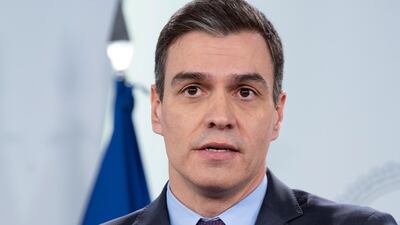Pressure on European leaders to go further and faster on a bailout for the devastated economies of the eurozone mounted on Monday amid a series of conflicting initiatives.
Leading German officials, Olaf Scholz and Heiko Maas, finance and foreign affairs ministers respectively, offered to make tens of billions of euros available without strings attached when countries sought a bailout after the last crash 12 years ago.
“For Italy, this would mean a fresh injection of €39 billion (Dh154.5bn), and for Spain, €28bn,” a statement by the German ministers on Monday said. “They should be allowed to use this money for all necessary expenditures to fight the coronavirus.”
For the hardest hit countries, the German position is not sufficient to overcome the effect of the shutdown of already debt-laden economies.
Pedro Sanchez, the Spanish prime minister, has demanded an entirely new mechanism that goes beyond the line of credit available under the European Stability Mechanism, which was set up after the global financial crisis.
“We must act now or never, because, right at this moment, Europe itself is at stake,” Mr Sanchez wrote in a syndicated appeal.
“It is time to break with old, national dogmas,” Mr Sanchez added. “Europe must build a wartime economy and promote European resistance, reconstruction and recovery,” he said. “It must start doing so as soon as possible with measures to support the public debt that many states, including Spain, are taking on.”
The Spanish demands echoed a call by Giuseppe Conte, his Italian counterpart, who sent a letter to Brussels last week urging swift action.
"European solidarity has not been felt and there is no more time to waste," it said. "It is time to show more ambition, more unity and more courage.”
Both men want a commitment to “recovery bonds” which have been dubbed coronabonds to substitute for state-by-state borrowing in euros. This would reduce the cost of debt and avert a failure to find financing.
Ursula Von der Leyen, the European Commission president, has taken a different tack, pushing for an expansion of the central European budget to lead the recovery. She took inspiration from the plans drawn up by George C Marshall, the post-Second World War US secretary of state, to invest in Europe. “To do this, we will need massive investment in the form of a Marshall Plan for Europe,” she wrote in an article also published on Monday. “And at the heart of it should lie a powerful new EU budget. The advantages of this are obvious: the EU budget is a proven instrument of solidarity and modernisation.”
Markets are focused on a meeting of the Eurogroup finance ministers by video conferencing on Tuesday where the “frugal four” (Germany, Netherlands, Austria and Finland) will be asked to compromise to shore up confidence.
















